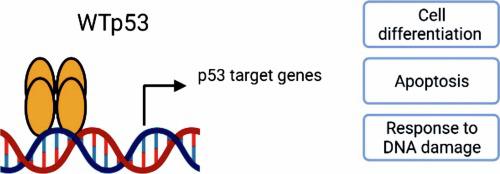Nanomedicine: Nanotechnology, Biology and Medicine ( IF 5.4 ) Pub Date : 2024-01-08 , DOI: 10.1016/j.nano.2024.102732 Divya Kamath , Tomoo Iwakuma , Stefan H. Bossmann

|
Among the tumor suppressor genes, TP53 is the most frequently mutated in human cancers, and most mutations are missense mutations causing production of mutant p53 (mutp53) proteins. TP53 mutations not only results in loss of function (LOH) as a transcription factor and a tumor suppressor, but also gain wild-type p53 (WTp53)-independent oncogenic functions that enhance cancer metastasis and progression (Yamamoto and Iwakuma, 2018; Zhang et al., 2022). TP53 has extensively been studied as a therapeutic target as well as for drug development and therapies, however with limited success. Achieving targeted therapies for restoration of WTp53 function and depletion or repair of mutant p53 (mutp53) will have far reaching implication in cancer treatment and therapies. This review briefly discusses the role of p53 mutation in cancer and the therapeutic potential of restoring WTp53 through the advances in mRNA nanomedicine.
中文翻译:

通过 mRNA 纳米递送恢复野生型 p53 来对抗癌症的治疗潜力
在肿瘤抑制基因中,TP53是人类癌症中最常见的突变,大多数突变是错义突变,导致突变 p53 (mutp53) 蛋白的产生。TP53突变不仅导致转录因子和肿瘤抑制因子的功能丧失(LOH),而且还获得野生型p53(WTp53)独立的致癌功能,从而增强癌症转移和进展(Yamamoto和Iwakuma,2018;Zhang等人)等,2022)。TP53作为治疗靶点以及药物开发和治疗已被广泛研究,但取得的成功有限。实现恢复 WTp53 功能以及消除或修复突变型 p53 (mutp53) 的靶向治疗将对癌症治疗和疗法产生深远的影响。这篇综述简要讨论了 p53 突变在癌症中的作用以及通过 mRNA 纳米医学的进展恢复 WTp53 的治疗潜力。



























 京公网安备 11010802027423号
京公网安备 11010802027423号